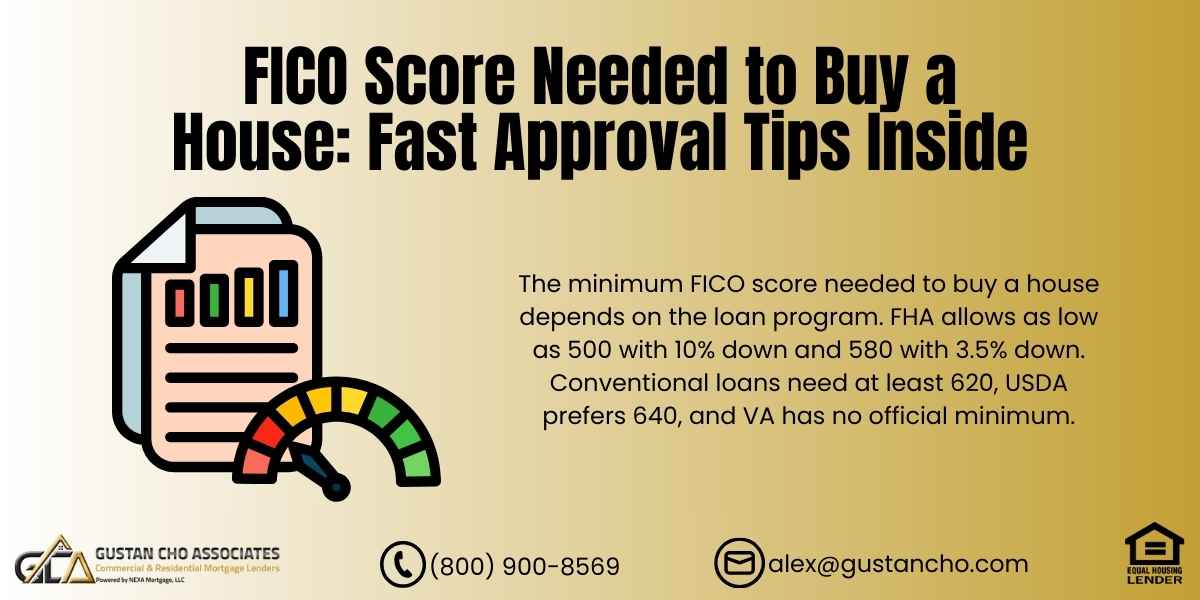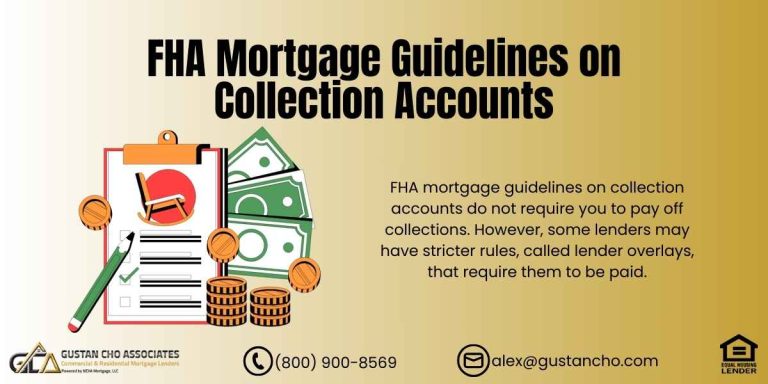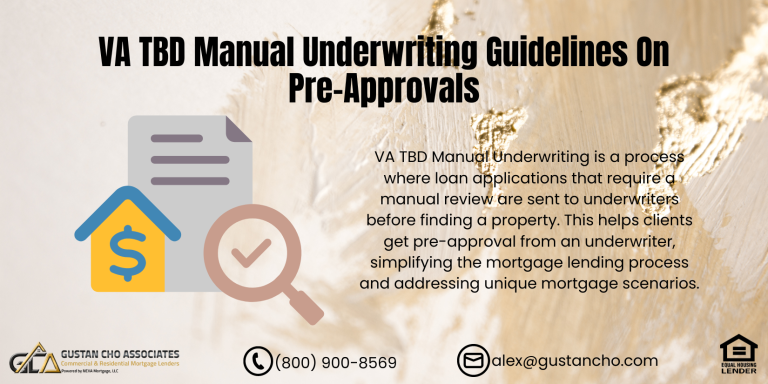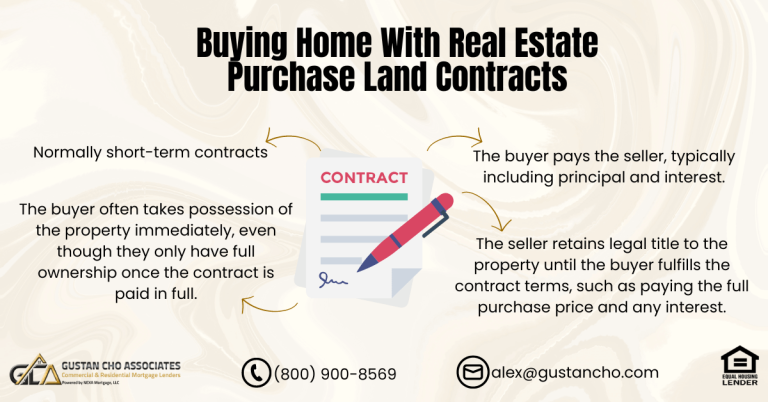Introduction: Your Credit Score Is the Key to Homeownership
Buying a home is one of the most significant financial steps you’ll ever take. But before you can get the keys, lenders want to know one thing: What’s your FICO score?
Your FICO score determines if you qualify, how much you’ll pay each month, and even how much you need for a down payment. The good news? You don’t need perfect credit to become a homeowner. In fact, thousands of families buy homes every year with scores in the 500s and 600s.
In this guide, you’ll learn:
- The minimum FICO score needed to buy a house in 2025
- How scores differ across FHA, VA, USDA, Conventional, and Jumbo loans
- The way your credit score influences interest rates and down payment amounts.
- Tips to boost your score quickly before applying
- What to do if you’ve been denied elsewhere
At Gustan Cho Associates, we specialize in helping borrowers with low credit scores, past credit challenges, and unique financial situations get approved. If you’ve been told “no” by other lenders, we may still say “yes.”
What Is a FICO Score and Why Does It Matter for Homebuyers
A FICO score is a three-digit number (300–850) created by the Fair Isaac Corporation. Lenders use it to predict how likely you are to pay back your debts.
Here’s how it breaks down:
- 800+ = Excellent
- 740–799 = Very Good
- 670–739 = Good
- 580–669 = Fair
- Below 580 = Poor
When you seek a mortgage, lenders get the FICO score needed to buy a house from three major credit reporting agencies: Equifax, Experian, and TransUnion. They take the middle score and use that to qualify you.
For example:
- Equifax: 580
- Experian: 640
- TransUnion: 620
- Qualifying Score = 620
That number determines whether you get approved, your interest rate, and how much you’ll pay for your new home.
Not Sure If Your Credit Score Qualifies? Let’s Check
Find out what FICO score you need for FHA, VA, or Conventional loans.
Minimum FICO Score Needed to Buy a House in 2025 (Quick Snapshot)
| Loan Type | Minimum FICO Score | Notes |
| FHA Loan | 580 (3.5% down) | 500 with 10% down |
| VA Loan | No official min | Most lenders want 580+ |
| USDA Loan | 640 (automated) | Manual underwriting possible below 640 |
| Conventional | 620 | Better terms at 700+ |
| Jumbo Loan | 700+ | Some flexibility with strong assets |
👉 As you can see, the FICO score needed to buy a house varies depending on the loan program. Let’s break them down one by one.
FHA Loans: Flexible for Buyers With Lower FICO Scores
FHA loans are a great choice for first-time homebuyers and anyone dealing with credit issues. They’re designed to help people from all financial backgrounds find a way to own a home. If your FICO score is 580 or higher, you only need 3.5%. Even if your score is between 500 and 579, you can still get a loan, but you’ll need to come up with a 10% down payment instead.
Plus, if you’ve had some recent late payments or collections on your credit report, manual underwriting can help you out. At Gustan Cho Associates, we’ve helped folks with FICO scores as low as 500 achieve their homeownership dreams using FHA loans. This flexibility makes FHA loans a solid option for many looking to buy a home.
VA Loans: No Official Credit Score Requirement
VA loans are a great way for veterans, active-duty folks, and eligible spouses to buy a home without all the usual hassle. They really make the home-buying process a lot easier. The Department of Veterans Affairs does not set a strict minimum credit score, giving borrowers more flexibility. Most lenders usually want to see a FICO score of 580 or higher. However, if you have solid reasons backing your application, you can still snag a VA loan even if your score is a bit lower.
One of the best things about VA loans is that you don’t need a down payment, making buying a home much easier for those who’ve served in the military. All these perks make VA loans appealing for eligible folks looking to own a home.
If you’re a veteran wondering about the FICO score needed to buy a house, know that VA loans offer the most flexibility.
USDA Loans: Great for Rural Buyers
USDA loans are a good choice for families with low to moderate incomes who want to buy homes in rural areas. If your credit score is at least 640, you can get approved using the USDA’s automated system. If your score is below 640, you may still qualify with manual review. One of the coolest things about these loans is that there’s no down payment required, which makes it way easier for families to buy a home without needing a lot of cash upfront.
If you’re looking for affordable housing in a rural area, USDA loans might be exactly what you need for your home-buying journey.
Conventional Loans: Backed by Fannie Mae and Freddie Mac
Conventional loans are one of the most common ways to finance a home, backed by Fannie Mae and Freddie Mac. If you’re curious about the credit score needed for a conventional mortgage, you usually need a minimum score of 620. However, if your FICO score is 700 or higher, you can get even better loan terms, like lower interest rates and smaller down payments. That’s why these loans are a popular choice for lots of homebuyers.
Additionally, private mortgage insurance (PMI) costs are often lower for those with higher FICO scores, leading to greater savings over time. Choosing a conventional loan over an FHA loan for borrowers with good credit can result in significant savings—potentially thousands of dollars. Even if your FICO score is at the minimum of 620, you still have the opportunity to qualify for a conventional mortgage, making it accessible to a wider range of homebuyers.
Jumbo Loans: High Credit Needed for Big Mortgages
You will need a jumbo loan if you want to buy an expensive home that costs more than the 2025 loan limits. Most lenders prefer a credit score of 700 or higher. However, some lenders accept scores between 660 and 680 if you have a good income and some savings.
Jumbo loans can be trickier to qualify for, but they offer some flexibility for those who have substantial assets. So, if you meet the strict requirements, you can still get the funds you need for that bigger mortgage.
Know Your FICO Score? See What Loans You Qualify For
We break down the credit score requirements for every loan type.
How FICO Scores Affect Down Payments and Interest Rates
Your FICO score is important for getting a mortgage and affects the deal you can get. For example, if you’re considering an FHA loan, you need a score of at least 580 to qualify for a 3.5% down payment. If your score is between 500 and 579, you’re looking at a 10% down payment instead. Plus, if you’ve got an FICO score of 760 or higher, you might snag an interest rate of around 6.25%. On the flip side, a score of about 620 could bump your rate to around 7.75%. Over 30 years, just a 1.5% difference in interest rates can add up to tens of thousands of dollars in extra payments.
Case Study: Buying a House With a 520 FICO
One of our clients had a 520 FICO score after medical collections. Banks denied him, but at Gustan Cho Associates, we approved him for an FHA loan with 10% down.
After raising his score within 18 months, he refinanced into a lower-rate Conventional loan. His story shows that homeownership is still possible even with a low FICO.
FICO vs VantageScore: Which One Do Lenders Use?
Many free apps (like Credit Karma) show VantageScore, not FICO.
- Mortgage lenders use FICO scores only.
- Lenders pull a tri-merge credit report and use your middle FICO score.
- Don’t rely on free credit apps when preparing to buy a house.
How Lenders Verify Your Credit Score
When you apply for a mortgage, lenders order a tri-merge credit report from all three bureaus.
This report shows:
- Payment history
- Balances
- Collections or late payments
- Your official FICO scores
The middle score is what counts—not the highest or lowest.
Improve Your Credit, Unlock Better Loan Options
Let’s create a game plan to boost your score and buy your dream home.
Steps to Improve Your FICO Score Before Buying a Home
Want to raise your FICO score quickly? Here are proven tips:
- Pay bills on time (payment history is 35% of your score).
- Keep credit card balances under 30% of your limit.
- Don’t open or close accounts before applying.
- Check your report for errors and dispute only after closing.
- Ask about rapid rescore services (we offer them for fast improvements).
Bumping up your FICO score by just 20–40 points can help you snag a lower interest rate and cut down on your monthly payments.
Manual Underwriting: A Path for Low Scores
Even if your score is too low for automated approval, you may still qualify through manual underwriting for FHA, VA, or USDA loans.
Manual underwriting looks at:
- Rent payment history
- Job stability
- Low debt-to-income ratio
- Extra savings or reserves
This is how many borrowers with scores in the 500s still buy homes.
What Happens if Your Score Drops During the Mortgage Process?
Your credit may be pulled again before closing. If it drops, you could:
- Lose your approval
- You will be required to bring more cash to close
- Get stuck with a higher interest rate
Avoid this by:
- Not opening or closing credit cards
- Not making late payments
- Keeping balances low
- Not disputing accounts mid-process
Average FICO Score for Mortgage Approval in 2025
According to industry data, the average approved FICO score in 2025 is 715.
But remember:
- FHA buyers often qualify with 500–600 FICO scores.
- VA buyers can get approved with scores well below 640.
- Conventional buyers with 620+ FICO are still getting homes.
Final Thoughts: You Can Buy a Home Even With Low Credit
The FICO score needed to buy a house depends on the loan program, but you don’t need perfect credit. Whether you’re at 500 or 800, there’s a path to homeownership.
At Gustan Cho Associates, we:
- Approve loans that banks deny
- Work with over 210 lenders nationwide
- Offer FHA, VA, USDA, Conventional, Jumbo, and Non-QM loans
- Never add extra overlays to guidelines
Borrowers who need a five-star national mortgage company licensed in 50 states with no overlays and who are experts on FICO score needed to buy a house, please contact us at 800-900-8569, text us for a faster response, or email us at alex@gustancho.com. The team at Gustan Cho Associates is available 7 days a week, on evenings, weekends, and holidays.
Frequently Asked Questions: FICO Score Needed to Buy a House:
Q: What is the Minimum FICO Score Needed to Buy a House in 2025?
A: The minimum FICO score needed to buy a house in 2025 depends on the loan program. FHA allows as low as 500 with 10% down and 580 with 3.5% down. Conventional loans need at least 620, USDA prefers 640, and VA has no official minimum.
Q: Can I Buy a Home with a 500 FICO Score?
A: Yes, it’s possible. The FICO score needed to buy a house with FHA can be as low as 500 if you can put down 10%. At Gustan Cho Associates, we often help buyers with scores starting at 500.
Q: What FICO Score is Needed to Buy a House as a First-Time Homebuyer?
A: First-time buyers can use FHA loans, where the FICO score needed to buy a House is 580 for a 3.5% down payment. If your score is 500–579, you’ll need 10% down.
Q: Does FICO Score Affect My Interest Rate?
A: Yes. The higher your score, the lower your rate. For example, a borrower with a 760 might get 6.25%, while someone with a 620 score may get 7.75%. That’s why improving your credit before applying can save you thousands.
Q: What is the Average FICO Score Needed to Buy a House Today?
A: The average FICO score needed to buy a house in 2025 is around 715. But thousands of people qualify every year with scores in the 500s and 600s, especially with FHA and VA loans.
Q: Do VA Loans have a Minimum FICO Score Needed to Buy a House?
A: The VA itself doesn’t set a minimum score. But most lenders ask for 580 or higher. At Gustan Cho Associates, we can sometimes approve VA buyers with even lower scores.
Q: Is the FICO Score Needed to Buy a House Higher for Jumbo Loans?
A: Yes. Jumbo loans for homes above the conforming loan limits usually need a FICO Score of 700 or more. Some programs may allow 660–680 if you have strong income and assets.
Q: Can I Get Approved if my FICO Score is Low, But I have a Big Down Payment?
A: Yes. Putting more money down can help balance out a lower credit score. For example, FHA lets you buy with a 500 score if you put down 10%. Lenders see a bigger down payment as less risky.
Q: What if My FICO Score Drops During the Loan Process?
A: If your score falls, you could get a worse rate, need more reserves, or even lose approval. That’s why you should avoid opening new accounts, missing payments, or maxing out credit cards before closing.
Q: Can Gustan Cho Associates Help Me if Another Lender Says My FICO Score is Too Low?
A: Absolutely. Many banks have extra rules (called overlays). We follow standard guidelines and work with over 210 lenders. Even if you were denied elsewhere, we may still approve you.
This blog about “FICO Score Needed to Buy a House: Fast Approval Tips Inside” was updated on September 18th, 2025.
Your Credit Score Is the Key to Homeownership
Learn how your FICO score impacts your mortgage approval and rate.










